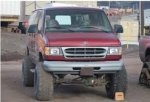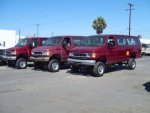- Forums
- Classified
- For Sale and Wanted Section
- Expedition Vehicles
- For sale - By ExPo members (*With Price*)
You are using an out of date browser. It may not display this or other websites correctly.
You should upgrade or use an alternative browser.
You should upgrade or use an alternative browser.
4x4 ford Van from McMurdo Station Antarctica!
- Thread starter Palmtech
- Start date
Msand
Importer
I've worked at McMurdo and Vostok station in Antartica, at McMurdo all the vehicles like this are stored in a Quonset hut 95% of their time while in Antartica. Winter overs are harsh on the rigs, but there is a strict schedule the field mechanics stick to when servicing them. The snowmobiles and snow cats are what get really beat up.. I'm actually suprised this van is in such good shape, did the gov install a hour meter? miles may be super low but the hour meter could possibly be through the roof.
yesDoes it have air conditioning?
Arctic Taco
Adventurer
I spent around 100 months at McMurdo and various field sites, including 3 winters, even drove a few of these the first winter-2000- they went into service. The best ones would have been assigned to the NYANG and NSF staff.
There are roads about 8-10 miles of gravel/dirt roads and about 30+ miles of packed snow roads.
No salt on the dirt/gravel roads- seawater is sprayed on the roads for dust control, maybe a total of 2 weeks a year, mostly during the ship offload.
Winter use, generally the active fleet is reduced by about 75% or so. The winter staff is around 200 people, down from around 800-1000 depending on what part of the summer season.
Storage wise- they are generally stored outside, either above Winter Quarters bay or up on Arrival Heights. Inside storage space is at a premium there. They do have some old decommissioned fuel tanks that they may have been stored in but mostly the would store large equipment tires in them. Perhaps the vans with poor fitting doors may have been inside stowed but I couldn’t say for sure.
They do strictly adhere to a standard cold weather maintenance program.
The lift kits came factory/dealer installed, with the stock tires- oversized tires came down in a separate shipping container. This was due to over height loading issues on the cargo ship. These came down on the cargo ship in 2000 and later versions came down in 02 I seem to remember. They all came down on a fleet turnover plan.
Low miles- lots of hours idling mostly. Everything in both the light vehicle and heavy vehicle fleet have/had hour meters- don’t know if they were removed before salvage.
Some are in better shape than others but pretty capable overall. Check door fitment- lots of sprung doors down there due to inexperienced vehicle operators and vehicle orientation in high winds.
As far as fuel economy, no idea- it’s a full size gas powered, lifted Ford 4x4 van- may or may not have 35” tires , giant fuel tanks though. I drive 1 ton Ford 4x4 gas trucks at work so I have-no bias.
All in all a good decent platform to work from for overlanding.
There are roads about 8-10 miles of gravel/dirt roads and about 30+ miles of packed snow roads.
No salt on the dirt/gravel roads- seawater is sprayed on the roads for dust control, maybe a total of 2 weeks a year, mostly during the ship offload.
Winter use, generally the active fleet is reduced by about 75% or so. The winter staff is around 200 people, down from around 800-1000 depending on what part of the summer season.
Storage wise- they are generally stored outside, either above Winter Quarters bay or up on Arrival Heights. Inside storage space is at a premium there. They do have some old decommissioned fuel tanks that they may have been stored in but mostly the would store large equipment tires in them. Perhaps the vans with poor fitting doors may have been inside stowed but I couldn’t say for sure.
They do strictly adhere to a standard cold weather maintenance program.
The lift kits came factory/dealer installed, with the stock tires- oversized tires came down in a separate shipping container. This was due to over height loading issues on the cargo ship. These came down on the cargo ship in 2000 and later versions came down in 02 I seem to remember. They all came down on a fleet turnover plan.
Low miles- lots of hours idling mostly. Everything in both the light vehicle and heavy vehicle fleet have/had hour meters- don’t know if they were removed before salvage.
Some are in better shape than others but pretty capable overall. Check door fitment- lots of sprung doors down there due to inexperienced vehicle operators and vehicle orientation in high winds.
As far as fuel economy, no idea- it’s a full size gas powered, lifted Ford 4x4 van- may or may not have 35” tires , giant fuel tanks though. I drive 1 ton Ford 4x4 gas trucks at work so I have-no bias.
All in all a good decent platform to work from for overlanding.
Last edited:
Forum statistics
- Forums
- Classified
- For Sale and Wanted Section
- Expedition Vehicles
- For sale - By ExPo members (*With Price*)


